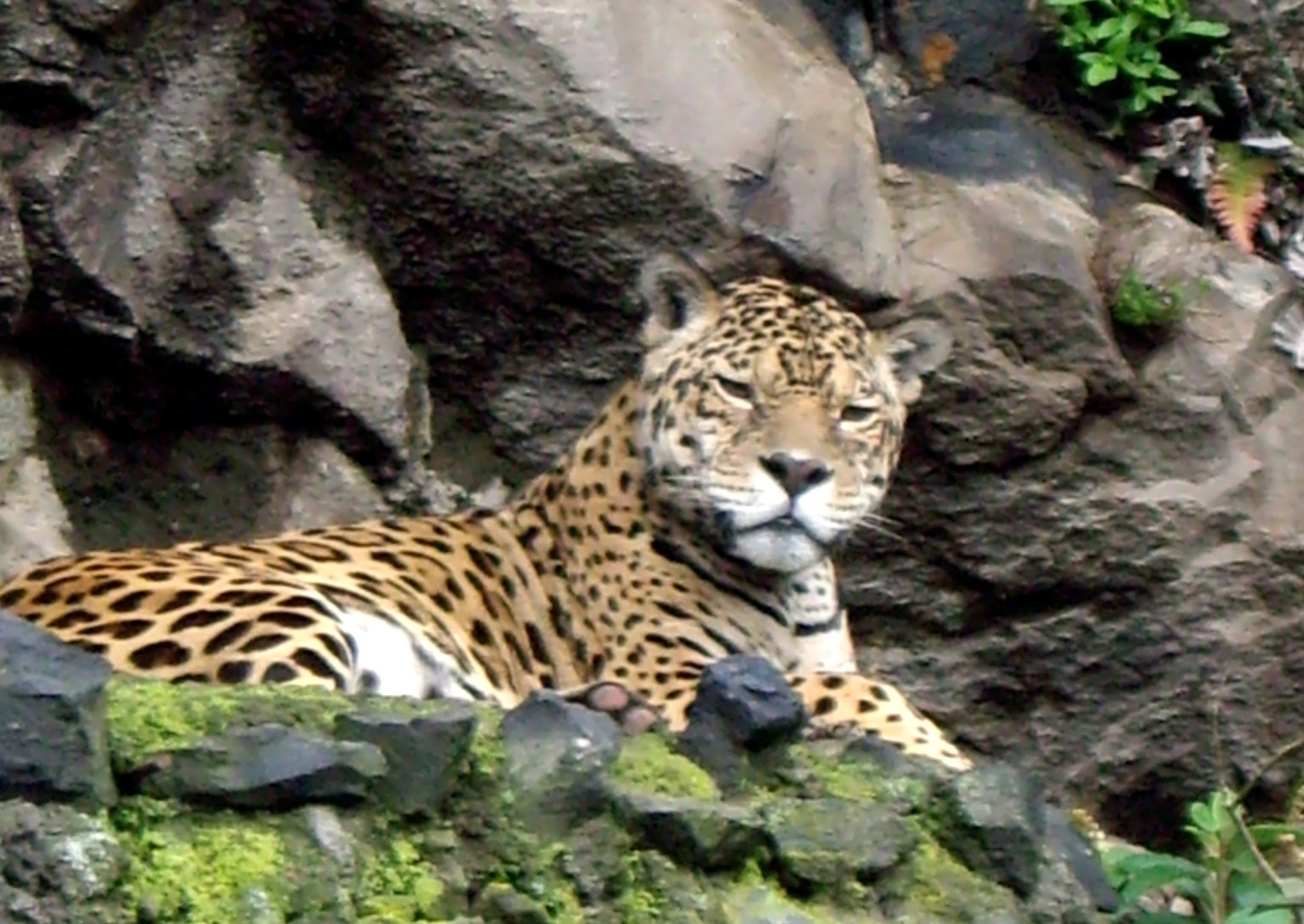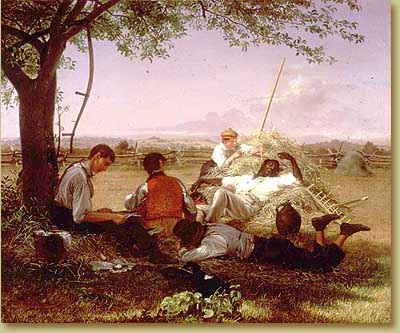 wild means?
wild means?Navigating the site:
How does defining "wilderness" pose a crucial problem for us?
question | etymology | meaning
Nash says: "The difficulty is that while the word is a noun it acts like an adjective."
p. 1.

"Wildeor, The place of wild beasts"
"A more precise meaning of wilderness as a forested land. . . "
Germanic word: "wildör signifies wild game."
"falta de cultura" -- meaning a lack of cultivation in Spanish
early thirteenth century the word appears. But was used in the Wycliffe Bible as an uninhabited place.
Also a place of trial and testing -- Moses wanders in the Sinai desert, Christ is tempted.
p. 2.
By defining wilderness as an absence of civilized or pastoral conditions, do we --in the end-- have a less than convincing description?
Sydney Mount, MIDDAY REST, Nassau County, Long Island. 1800s.
"highly prized -- cultivated landscape" of the Augustan Age, and later.
p. 10.
"The etymology of the word itself offers one approach to understanding."
"root seems to have been 'will' in Norse, from the word in Swedish, implying lost, unruly, disordered, unable to control, or ungoverned."
p. 1.
"inability to control"
"terror of the wild."
"Pan, the lord of the woods … combined gross sensuality with boundless sportive energy."
"the word panic originated from the blinding fear that seized travelers upon hearing the strange cries in the wilderness."
p. 11.
"The semi-human wild man. . . . lived in the heart of the forest as far as possible from civilization."
p. 12.
"Wilderness was the environment of evil."
p. 15.
"the Judeo-Christian tradition in arousing and nourishing antipathy."
p. 20.
Eastern, Asian nation's traditional (Hinduism, Buddhism, Taoism, and Confucianism) concepts:
"Nor did they feel the conflict between religion and appreciation of natural beauty which caused Petrarch's anguish on Mount Ventoux. But Western thought generated a powerful bias against the wilderness, and the settlement of the New World offered abundant opportunity for the expression of this sentiment."
p. 22.
Outside and Uptight : Examining the Buttoned-down Mind
When Roderick Nash first published a slimmer volume of Wilderness and the American Mind, in 1967, The book represented two significant trends in cultural and literary life in the country steeped in anti-communism and struggling half a world away in Viet Nam to make the world safe for democracy.
First the book represented and Anglo-American, and hence unified stance on the part of we, the colonial upstart and our Mother country because the book portrays the commonality of European roots and the national character as it developed in the United States.
Secondly the book seeks to discover an underlying identity in the American conservation tradition. That search for identity came on the heals of the "beat tradition" developed in the 1950s from the hip urban jazz infused subculture and the developing counterculture as influenced by beat writers from Ginsberg, Kerouac and Ferlinghetti, to Gore Vidal, Ralph Ellison, and Betty Friedan.
Clearly Nash is trying to identify with the American landscape, but not so much as Whitman in finding his way on the open road, as seeing the man-child in the promised land as arising from and returning to a wilder condition. Like Rousseau, the antecedents of neo-romanticism described in Nash's book, lead the author to find inspiration,fulfillment, vigorous challenges, and an American ethos in the wild.
At a time when the jungles of Viet Nam and the rice paddies of south east Asia were the sigh of a titanic struggle between nationalism and anti-communism, Nash had sought to define the character of the "Quiet American" who was dying overseas and the source of that character was in the frontier expedience, that borderland where western civilization became submerged in the native American condition.
The frontier, however, was as much an urban legend fed by Hollywood movies called "westerns," TV soap-opera westerns and the Disney images of Bambi or the grandeur of the scenery of the mountain west.
In the land of the "establishment" where the "Man in the Grey Flannel Suit" represented the dominant metaphor for male "Americana," Nash sought to bolster this urbane image with the "he" man and heartiness that grew up with the frontier, built the cities, and defined what was wholesome in America as emerging out of a state of nature. Just as the nation was about to be torn apart by war, race relations and a reaffirmation of older ideas concerning an autonomous role for women, Nash reconciled the tension between the "beats" and the "establishment" of the 1950s and 1960s with a call of the wild, a return to our roots, in a search for meaning in the mountains that have always fed equally our urban needs and our imaginations.
He --Nash-- then is a kind of rear window revealing the anxieties of the urban, sophisticated, intelligent person, which I am referring to as "the buttoned-down mind." Based on the comic Bob Newhart's title for his wildly successful first album, the buttoned-down mind refers to a kind of restrained and dignified set of attitudes of the post war world where conformity and solidarity were valued far more than freedom and self-assertion.
JVS, 8-26-05
A. Wild is defined as a cultural concept.
B. Wild is defined as a delineating sort of argument about biology.


